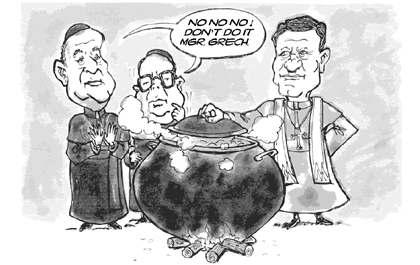
| EDITORIAL | Sunday, 13 April 2008 One giant step towards justice
By deciding to go public with the results of an inquiry into child abuse at the Lourdes Home for children in Gozo, Bishop Mario Grech has made history in more senses than just one.
The Gozo Bishop has embarked on an apparently new direction for the local Church when it comes to dealing with cases of abuse involving members of the clergy. He has also taken the courageous step of making contact with the victims themselves, and pledging support to help them overcome their trauma: a first for Malta, which has seen its fair share of child abuse scandals in the past. Allegations of criminal misbehaviour at the Dominican-run crèche, involving violent and often sadistic treatment of children, first surfaced during a current affairs programme on ONE TV in 2002. At the time, the Gozo bishop was Mgr Nikol Cauchi: who, like his Maltese colleague Mgr Joseph Mercieca, tended to adopt an altogether more arcane attitude towards such potentially scandalous matters. To be fair to both these stalwarts of the local Church, the Maltese bishops were simply enacting official Vatican policy as they interpreted it at the time. In fact it was only in August 2003 – a year after the Lourdes Home allegations were made – that The Observer (UK) revealed details of a secret document dating back to 1962, retrieved from the Vatican archives by Texan lawyer Daniel Shea, which required priests to maintain absolute secrecy over such cases, on pain of excommunication. Among other things, the 69-page Latin document, bearing the seal of Pope John XXIII, instructed bishops to treat cases of the “worst crime” – defined as obscene acts with young people of either sex or animals – “in the most secretive way”. “Everyone . . . is to observe the strictest secret which is commonly regarded as a secret of the Holy Office . . . under the penalty of excommunication,” the papal document warned. Lawyers acting for alleged victims of abuse cited this document as proof of how the Vatican had for decades systematically obstructed the course of justice in order to protect Catholic priests. For its part, the Holy See always maintained that the document in question only referred to Church law, and was never used to cover up any actual abuse cases. Either way, however, the result was an overwhelming tendency of the part of Catholic Church worldwide to maintain strict confidentiality in such cases: a policy enacted also in Malta, where the Archbishop’s Curia set up a response team, headed by retired judge Victor Caruana Colombo, to investigate all allegations behind closed doors. Admittedly the Lourdes Home case deals more with physical than sexual abuse, although the border between the two is all too often blurred. But upon assuming office in January 2006, Bishop Mario Grech ordered a re-investigation of the case; and two years later he took the unprecedented initiative of announcing the report’s findings, and made a public apology on behalf of the Church to all the victims. As for the full report itself, Bishop Grech has decided against making it available to the media. He has been criticised for this in some quarters; but to all effects and purposes, the publication would only add a few individual details to a sordid picture, which is already clear enough to all who have followed the case. Besides, even without publishing the full document, the Bishop’s public apology in itself makes further public elaboration of the case unnecessary. What remains to be established are the steps or measures that the Gozo Church can adequately take to avoid any repeat occurrences, and to atone for the psychological trauma suffered by children raised in the Lourdes Home. There has been already talk of financial compensation for the victims: some of whom, apart from suffering a heinous injustice, were also landed with considerable medical expenses to cope with the lifelong consequences of abuse (psychiatric care, prescription drugs, etc.) But Malta at present lacks any formal mechanism for this sort of compensation; and short of criminal action against the perpetrators (which is no longer possible, as the case is now time-barred) there is no effective legal remedy that can be applied. Nonetheless, the Bishop of Gozo has enough room to manoeuvre outside any formal procedures; he has already made contact with the victims, and the most likely scenario remains some form of out-of-court settlement, which would help them put this execrable scenario behind them once and for all. The need for this to be done is best articulated by one of the victims themselves, who was reported as saying: “I still dream that a person is hitting me. I am still living the experience, and this bothers me because I want my life to change. But before justice is made, I do not think I can get over it.” Bishop Mario Grech has taken at least the first step towards achieving this long-overdue justice; one can only hope that his not-insignificant gesture will usher an era of greater transparency and openness in such deplorable matters. Any comments? |
Copyright © MediaToday Co. Ltd, Vjal ir-Rihan, San Gwann SGN 9016, Malta, Europe
Managing editor Saviour Balzan | Tel. ++356 21382741 | Fax: ++356 21385075 | Email
Managing editor Saviour Balzan | Tel. ++356 21382741 | Fax: ++356 21385075 | Email
